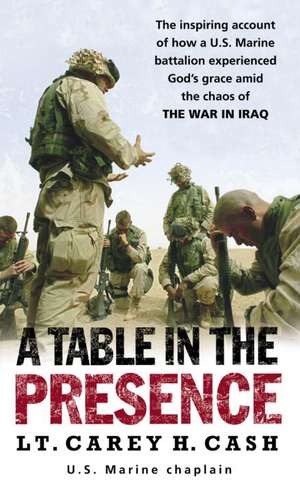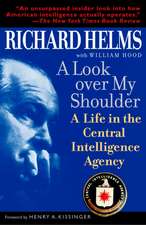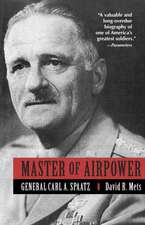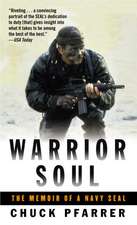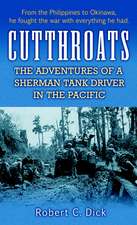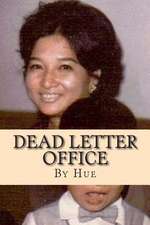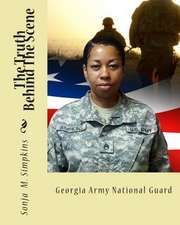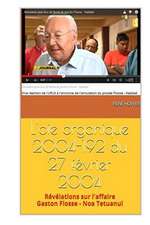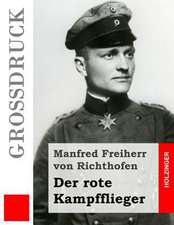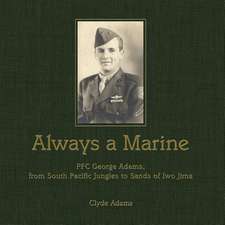A Table in the Presence
Autor Carey H. Cashen Limba Engleză Paperback – 30 sep 2005
–Psalm 23:5
There are some places where you just don’t expect to find God. For the men of the 1st Battalion, 5th Marine Regiment, downtown Baghdad was one of those places. Moving into the heart of Iraq and ever deeper into enemy territory, they found themselves face-to-face with the ruthless Iraqi Republican Guard and Fedayeen militia. But when the smoke cleared, God’s touch was clearly visible.
Serving as a chaplain to the U.S. Marines, Lieutenant Carey Cash had witnessed the miracles that began in the desert of northern Kuwait, and found their culmination in one of the fiercest battles of Operation Iraqi Freedom. With vivid detail and gripping emotion, Lt. Cash gives a firsthand account of this amazing story–how the men of an entire battalion found God in the presence of their enemies.
Preț: 46.13 lei
Nou
Puncte Express: 69
Preț estimativ în valută:
8.83€ • 9.11$ • 7.37£
8.83€ • 9.11$ • 7.37£
Carte disponibilă
Livrare economică 05-19 martie
Preluare comenzi: 021 569.72.76
Specificații
ISBN-13: 9780891418887
ISBN-10: 0891418881
Pagini: 241
Dimensiuni: 107 x 173 x 20 mm
Greutate: 0.18 kg
Editura: Presidio Press
ISBN-10: 0891418881
Pagini: 241
Dimensiuni: 107 x 173 x 20 mm
Greutate: 0.18 kg
Editura: Presidio Press
Notă biografică
Lt. Carey H. Cash is a battalion chaplain to infantry Marines in the United States Navy. In Operation Iraqi Freedom, his unit was the first ground combat element to cross the border into Iraq. He is a graduate of Southwestern Baptist Theological Seminary and was commissioned as a chaplain in 1999. Cash and his wife, Charity have five children, and live near Norfolk, Virginia.
Extras
An Unexpected Feast
“Wake up!”
As the lights to our squad tent flickered to life, I struggled to wipe the sand and grit out of my eyes and to sit up in the sleeping bag that for the last six weeks had been home. I only needed to take one look at the face of my executive officer, Major Cal Worth, to realize what was happening. His eyes were like steel; his face, expressionless. My heart raced.
“You have five hours to get your gear packed and yourselves into your vehicles. We’re moving north!”
You could have heard a pin drop in the tent. It was an announcement we had been expecting for weeks, yet his words hit us like a train.
“Any questions? No? Good! Then be advised there will be a mandatory staff meeting in thirty minutes. You’ll get more info then. Get moving!” With that he turned and walked out.
For the next few moments, no one moved a muscle. We sat on the tops of our sleeping bags in shock, wrestling with the magnitude of what we’d just heard. We looked at one another, but no one said a thing. We didn’t have to. The words still lingered in the stale air of the tent. Then finally, as if we were responding to a choreographed script, every one of us jumped up and started packing our gear.
Within minutes, I could tell that the message was permeating the entire camp. Senior Marines were barking out orders. Trucks, tanks, and High Mobility Multipurpose Wheeled Vehicles (HMMWVs or Humvees) were being moved into place. More than one thousand infantrymen, living in a space no bigger than a parking lot, started packing their personal supplies, filling their canteens, double-checking the status of their ammunition, writing last-minute letters, and saying prayers.
A young officer grabbed my arm. “Hey Chaplain, if something should happen to me, will you give this letter to my girl?”
Hey, wait a minute, I thought. That’s just for the movies.
The man who handed me the letter was a decorated combat veteran. He had been among the first to land deep in enemy territory in Afghanistan. He’d been through this before, and his face was quite serious. I took the letter.
“It’s going to be okay,” I reassured him.
Was I sure about that? I tucked his letter deep within my pack, quietly hoping that I would never have to pull it out.
Meanwhile, the frenzy of activity intensified. I could see the camps next to ours springing to life as well. Flashlights from every tent shot beams across the clear desert sky. Engines rumbled to life. The sound of men’s voices, some laughing and joking, some urgent and tense, were echoing from camp to camp. This was it! We were all heading out. Would we ever see this place again?
It was the evening of March 17, 2003. We had already been in the desert for forty days. Tired and restless, we were quite honestly wondering if the war was ever going to get kicked off. Two or three weeks were all that we’d expected to wait before the official word came to invade Iraq, yet there we were, approaching a month and a half. By now the days were growing longer, and the sun was getting ever hotter. The hope of a hot shower had all but evaporated, and shaving was merciless. The cold water had dulled the last of our razors, producing a wide variety of facial grimaces each morning as we pulled and tugged on our beards.
And then there were the sandstorms. Before arriving in Kuwait, we had all been told about the intense desert winds. But there was no way we could ever have anticipated how vio- lent the storms would get. The weather pattern that brought them about was no mystery. When the wind blew in from the north, we enjoyed clear skies. But when the wind shifted directions and started blowing from the south, the sky would turn a deep dark blue, then brown; and then, like a thundering horde rolling indiscriminately over man and beast, the stinging sand would consume us. There was no escaping its relentless barrage. At times it would beat its implacable drum against our tents for hours. Our romantic notions were fading fast as every new sandstorm further eroded the grandeur of “going off to war.”
During those forty days, when we weren’t rehearsing our attack, we spent much of our time laboring to piece together any fragments of news we could get our hands on. What was happening in the White House? In Baghdad? Had diplomacy run its course? What of the inspectors searching for weapons of mass destruction? How were Americans viewing the war? How were they viewing us? How real was the threat of chemical weapons? Would the enemy surrender quickly? Or would he fight to the death?
We were all asking the same questions. We were all looking for something, anything, to cling to; any precious bit of news that might provide us with some sense of certainty either way. In the end we would have to settle for outdated newspapers and garbled radio transmissions that relayed as much static as commentary. Phone calls were precious but rare; the mail was slow. After forty days in a vast and often unforgiving desert, urgency had faded into monotony.
Marines and soldiers, however, have solutions for deal- ing with monotony. In fact, every Marine who is qualified enough to rise to the rank of corporal is expected by his command to be able to accurately diagnose the morale of his men and to come up with some clever antidote for the ailment, like a doctor who writes out prescriptions for sick patients. Of course the antidotes are as diverse as the men who think them up—a forced march, a grueling run. Or, if the men are lucky and their leader happens to be in particularly amiable spirits, the prescription might be a Humvee pull, a tire-throw, or a tug-of-war match.
On that particular Tuesday night in mid-March, it was obvious that no half-measures would do. The frustration of waiting had finally worked itself, like a thorn, into the skin of most of us. Faces were growing long. Arguments were becoming a daily ritual. Friendships were strained. Something had to be done, so the decision was unanimous. The antidote to our desert malaise would be a talent show.
As word leaked out about the night’s main event, I could sense growing excitement. At least I know I was looking forward to it. For six weeks, everything had been business: chemical weapons drills, battalion hikes, live-fire ranges, late-night staff meetings, intelligence updates. We knew we were there on a mission, and from day one, we did nothing but prepare ourselves for it. So when the decision was made to host a battalion-wide talent show, it was as if a breath of fresh air blew throughout the entire camp, enlivening even the most dispirited man.
I had just finished off the last of my broiled chicken and rice and was enjoying the sweet taste of my warm soda when I first began to hear laughter. It wasn’t the roaring kind of laughter you might expect to come from the lungs of grown men or warriors. This was more like snickering and giggling, the kind of laughter you’d hear behind a child’s door at a slumber party. I was amused but also intrigued. The sound of the voices began to lighten my spirit, and like a magnet, it pulled me outside into the cool desert night to investigate. As I walked from tent to tent, I could see groups of Marines and sailors huddled together, feverishly planning out their appearances for the night’s coming festivities. They were rehearsing every type of act imaginable: singing, skits, stand-up comedy, classical guitar, and just as I expected, those always-feared, never-avoided impersonations.
Young infantrymen—also known as “grunts”—can’t get away with much when it comes to challenging authority; and few ever try. However, impersonations are different. Impersonating a senior-ranking Marine is, to my knowledge, the one and only time a grunt can take a stab at his superiors and still come out alive. It’s almost sacrosanct; an understood realm of asylum, of immunity from reprisal. Overhearing some of the skits and impersonations that a few brave men were planning that night, I knew that some of them were sure to get a rise from the crowd that was already beginning to gather around the seven-ton truck that now doubled as our stage.
By 8:00 p.m., the judges were in place, the performers were ready, and the audience was stirring. Under dim flickering lights, and armed with a substandard sound system, the men of First Battalion, Fifth Marine Regiment hosted what must have been the finest talent show the northern Kuwaiti desert had ever witnessed.
Of course I had seen grown men laugh hysterically before. Having attended a military college where I played varsity football, I’d known my own share of rowdy evenings out with the guys. But this was altogether different. More than a good time, this was a release. This was six weeks of pent-up tension and anxiety erupting into the night sky in the form of laughter and cheering. There was no doubt that every person out there needed that night to chase away the stress and frustration of the last six weeks of waiting. We needed it to drive away the feelings of loneliness that grew stronger with every passing night. We needed it to deal with our fear.
Yet therapeutic as the evening was, I couldn’t shake the feeling that something was about to happen. There we were in a hostile land, only miles from a border where enemy soldiers patrolled continuously. We all knew that an order might come down at any moment, leading us into mortal combat. Shadowing our exuberance and elation was the very real and imminent prospect of danger and death. One thousand of us were laughing, singing, and cheering; yet we were also poised to enter a different world, where such festivi- ties would be impossible. Was this, quite literally, the last hoorah?
I didn’t share my uneasiness with anyone else, but I am certain others felt the same way. Nevertheless, inebriated by laughter and camaraderie, all one thousand of us went to sleep that night in peace about 11:00 p.m. Three hours later, we learned that our lives were about to change forever.
In those silent seconds following Major Worth’s middle-of-the-night announcement, my thoughts turned toward my fellow chaplains. The four of us had ministered together for six weeks in the desert. We each represented different Christian faith groups: Chaplain Frank Holley, a Methodist; Chaplain Erik Lee, a Nazarene; Chaplain Mark Tanis, a Lutheran; and I, a Baptist. In the course of those weeks, we had all become close friends, even brothers. We conducted services together, assisted each other in baptisms and counseling, and offered one another a listening ear when we needed to vent. When would I ever see them again?
My mind snapped to at the sound of a familiar voice.
“Sir, do you need any help loading your supplies?”
It was a voice I recognized well, even in the dark. Second Class Petty Officer Redor Rufo was my personal assistant—a religious program specialist (RP), who assists me in the administrative tasks required to conduct ministry. That is not, however, his only job. In war, the RP is a chaplain’s bodyguard. Geneva Convention and navy regulations do not permit chaplains to serve as combatants. In fact, a chaplain is the only member of the entire military who is not permitted to brandish a weapon. Chaplains sometimes speculate about what they would do if their men were overrun, if they had the choice to defend themselves with a rifle or pistol. It’s a tough call, but I always thought that if the life of a fellow Marine or sailor was at stake, I’d use the weapon.
Nevertheless, I knew Rufo would not hesitate to use his rifle if we ever found ourselves in real danger. He had the heart of a giant and the tenacity of a street fighter. A 5'4" Filipino-American with a stout build and cackling laugh, Redor Rufo had come to the States when he was in high school, following in the footsteps of two older brothers who had joined the navy before him. Always the generous peacemaker, Rufo overwhelmingly won the affection of the senior men in the battalion just two days after he arrived. He managed to do this by cooking up some of his famous panzet and lumpia, and serving them out of our office space.
Rufo’s spirited generosity was no passing fancy. He’s the only man I’ve ever heard kidding about having his own island one day; he would call his island Rufo Island, and he would be its benevolent dictator. The truth is, although farfetched, anyone who knew Rufo could easily see him doing just that: granting favors, pardons, gifts, and loving every minute of it. Still, kind and peaceable as he was, Rufo knew how to scrap. It didn’t take me long to learn that despite his small frame, he could hold his own with anybody.
The two of us had served together since April 2002, when he joined the battalion. Every day had been an opportunity for us to grow in our mutual trust and respect for one another. Everywhere I went, Rufo was with me. If it meant walking the line together for hours on end, talking to young warriors in fighting holes, he walked beside me. If it meant setting up and taking down for eight worship services in one day, he was there, never flagging in zeal, always an encouragement to the other men in the battalion.
As the two of us loaded supplies into our Humvee, I sensed a note of pain in his voice. “I got to talk to my wife last night, sir. I waited in line for the phone for hours, but I finally got through. I’m so glad I did.”
Calling home from Kuwait was definitely a rarity. There was only one phone for more than a thousand men, and more often than not, the phone wasn’t working. When the phone actually functioned, you had to be prepared to speak to your loved one through a three-second delay.
“Hello . . . can you hear me?”
Three to four seconds would pass, and then the voice on the other end would inevitably answer, “Yes . . . I can hear you . . .”
On and on this would go, until “good-bye.”
Calls home had the effect of producing both joy and pain. We were elated anytime we had the opportunity to call our wives or parents. Yet with each phone call came the quiet realization that this call might be the last one before we went into battle. Every word spoken was precious; every moment, dear. As good as it felt to hear your loved one’s voice, many of our men said that it caused more pain than anything else. I know it did for me. It reminded me of home. And there were more than a few in our battalion who deliberately chose not to call. I could understand why. It just hurt too much.
Clearly, Rufo was glad he’d been able to talk to his wife. But I could tell there was an ache in his heart. There was one in mine too.
It had been more than a month since I had spoken to my wife, Charity, and that conversation had lasted only a few minutes. When the phone rang in our Southern California home, it was 4:00 in the morning.
Charity’s voice, suddenly stirred out of sleep, quietly answered, “Hello.”
Overjoyed to hear her voice, it was all I could do not to shout to her, “It’s me—Carey!”
Immediately, I could tell that she had begun to cry. We both started crying as a flood of emotions swept over us.
“I don’t know when I’ll be able to talk to you again, but just know that I am doing well. God is taking care of me.”
For security purposes, I was not able to tell her exactly where I was, when we thought we might be moving north, or how long our stay might be. But that didn’t matter. More than anything else, I wanted her to know that I was okay, that the men were doing well, that we were relying on the Lord, that her prayers for us were being answered daily in our lives, and, most of all, that I loved her and the children. Every minute of the conversation was filled with meaning, every word heavy with emotion. We were eight thousand miles away from one another, and we were separated not only by geography, but by the naked truth that war and death loomed, and that I might never return.
And yet, never in all my life had I felt as connected to Charity as I did in that conversation. With only minutes to speak, we shared with one another only those things that mattered most.
“Honey, I love you.”
“I love you too,” she said.
“Tell the kids that Daddy is safe, that he is right where God wants him to be. Remember that every night when you look at the moon and the stars, they are the same stars that I saw just a few hours earlier.”
I wanted to remind Charity that the same God who had brought us together eleven years before was walking with each of us. He was walking with me in a hostile desert, upholding me as I ministered to Marines on the threshold of battle. And He was walking with her within our busy home, sustaining her as she raised our five children, strengthening her as she encouraged other military wives. When we said good-bye to one another, tears streamed down our faces.
I ached that night as I’d never ached before. And now Rufo was feeling much the same way.
Finished with loading supplies in my Humvee, I asked him to double-check the status of his rifle and ammunition. By 0500 that morning, we could see the faint hue of the Middle Eastern sun beginning to cast an orange glow across the desert floor. As vast and desolate as the northern Kuwaiti desert was, a calm beauty spread across it when the sun rose each morning. I often saw Marines standing outside their tents sipping instant coffee in the early hours of the morning for no other reason than to watch the rising sun and enjoy those brief moments of tranquility. Today would be different. Now, as the sun began to bathe the tops of our tents with light and warmth, the results of the night’s activity became visible.
The assembly of our vehicles was formidable. Amphibious Assault Vehicles (AAVs) equipped with heavy machine guns were lined up as far as the eye could see.
These massive troop transports were originally designed to make the grueling ship-to-shore invasions that made the Marine Corps famous in World War II, Korea, and Vietnam. We had come to see that they also made for excellent troop carriers in the desert, capable of carrying twenty-five Marines armed with 50-caliber machine guns, Mark-19 grenade launchers, and able to move at well over 30 mph on the loose desert floor.
Other vehicles found their way into the convoy. Seven-ton trucks loaded with supplies vibrated back and forth, their engines idling, their drivers ready for the word to go. Combat ambulances, marked with the familiar Red Cross, sat positioned behind the protective shield of tanks and armored (“hardback”) Humvees. Communications antennas sprang up from the tops of the command and control vehicles, each antenna serving as a potential lifeline should our troops somehow become separated from the others.
One by one the drivers of each vehicle gave a thumbs-up sign, indicating in no uncertain terms that they and the men for whom they were accountable, were ready. A staff sergeant walked the line of the convoy, making a last-minute check with each crew.
“Got everything you need?”
“Are all your people accounted for?”
“Gas? Chow? Water?”
All he needed to hear from the driver was a “Good to go, Staff Sergeant!” At that, he pounded the side of the vehicle, as if to say, “This one’s ready!” And on he would go to the next vehicle.
Rufo and I sat there awaiting the moment when the wheels on the vehicle in front of us began to roll. The sun was completely visible now, and the dust stirred up by all the movement had shaded it into a dull burnt orange. For just a moment, it reminded me how the sunrise over Camp Pendleton, California, slowly burned away the early morning fog.
Rufo and I had driven together countless times in California. We had spent an entire month in the desert at Marine Corps Air-Ground Combat Center, Twenty-nine Palms, driving from one unit to another, conducting services and offering on-the-spot counseling. We were well prepared for today, but no amount of experience or training could have readied us for the adrenaline that surged through our veins as we waited to move toward the border of Iraq. The sound of the engines running in the convoy was like a powerful symphony, alerting anyone who stood in our path that trouble was coming.
“Make Peace or Die!” was the official motto of our battalion. As we finally pulled out into the vast Kuwaiti desert, the sight of our convoy moving must have proclaimed that motto loud and clear.
For approximately eight hours we drove. We inched slowly along, stopping routinely for situational reports and double-checking the maintenance of the vehicles. Twenty miles later, the landscape had barely changed; desert looks like desert wherever you are. But by afternoon, we knew we weren’t in the same place. We had arrived at a position not far from the Iraqi border, well within range of Iraqi artillery shells.
Once we turned off our engines, we had a chance to reflect on the day’s events and ponder what lay ahead. The desert was quiet. There was a gentle breeze blowing from the southwest. As I opened a Meal Ready to Eat (MRE), I looked at the men who were about to step across the threshold into battle. They were milling around their AAVs, each one carrying a rifle and a knife; all of them fitted with flak jackets and helmets to protect them from enemy bullets or razor-sharp shrapnel. As I watched them, it occurred to me that tech- nology has done much to change the face of war, but not the face of the warrior.
For some reason, I thought about Joshua in the Old Testament. He knew what war was all about. He had seen its deadly effects—the bloodshed, the burning villages, the charred remains of resisters. Yet he knew that the real battle lay not in the brandishing of swords or in the shooting of arrows, but in the realm of faith.
In those few quiet moments, I pondered where we were in the world and what our president was about to call us to do. I began to see that for us, as for Joshua, the real battle would be won or lost before we even crossed the line of departure into Iraq. Each of us had to find courage, faith, and quiet resolve, and to experience a peace that surpasses understanding—these were the real victories that had to be won in each of our lives.
As the sun began to give way to the deep blue haze of dusk, I hoped I understood the task that lay before me. I prayed for God’s help and strength:
Lord God, prepare me for these last hours before the battle begins. Help me to faithfully offer to these men the same strength and courage that You have given to me so many times before when I have been faced with trial. Help us all to remember the promise of Your Word, which tells us not to fear or be dismayed, but to be strong and courageous, believing that You, Lord, will be with us wherever we go.
19 March 2003
SITUATION UPDATE: ENEMY SURFACE-TO- SURFACE MISSILES LIKELY WITHIN NEXT 24–48 HOURS. CHEMICAL WEAPONS POSSIBLE.
The warning spread rapidly through our particular section of the battalion’s convoy. I was in the section called the “com- bat train.” We were fifteen vehicles strong and consisted of the battalion’s surgeon, medical corpsmen, ammunition and food resupply personnel, vehicle maintenance personnel, nuclear/biological/chemical experts (NBC folks for short), and the battalion’s chaplain and RP. The combat train’s job was simple: follow directly behind the lead combat elements of our battalion with ready resupply materials. It was the perfect place for me to be. I was almost always within sight and sound of our front-line troops, yet back far enough to monitor the situation on the communication channels and able to drive immediately to any platoon or augmenting unit that needed me.
Normally, a Marine Corps battalion consists of about nine hundred men, all assimilated within a certain company, platoon, and section. However, in times of war, a typical infantry battalion grows to more than twelve hundred men, as special units augment or attach to the battalion. Because these units become a part of us, in essence I become their chaplain as well.
And we definitely had our share of attachments. There were the military police (MPs), who were there to help us process potential enemy prisoners of war (EPWs). There were combat engineers who, despite their name, did a lot more demolition than construction. There was the human intelligence exploitation team (HUMET), which was always moving in and out of the periphery of our battalion, talking among themselves in corners, giving closed-door briefings to our battalion commander, dealing quietly with other unrecognizable operatives in our regiment, and even working at times with the CIA. We never knew exactly what the HUMET was up to, and that’s exactly how they wanted it.
Working alongside the HUMET were the ever-flamboyant army special forces. While not officially attached to our battalion (although they were assigned to our regiment), these warriors brandished mustaches and long hair, wore civil- ian clothes, and drove SUVs. They made their appearance known in our ranks on more than one occasion, especially in the last days before we received official word to move from Kuwait to the border. Wearing jeans and toting .50-caliber machine guns, they never had to explain themselves. In fact, in our eyes, they were just plain cool, having all the firepower of a Marine infantry platoon, minus the desert camouflage (cammies) and grooming standards. Although we didn’t have many dealings with these outlaw soldiers before the war, their presence would dramatically save the lives of many of our Marines one unforgettable day in Baghdad.
And then of course, there were the workhorse attachments: AAVs, or “Tracks,” who provided us with armored transportation from beginning to end; Second Tanks, with their heavy gun security; explosive ordinance demolition (EOD), whose singular job was to detonate weapons or ordinance caches found in Iraq; and finally artillery, or as affectionately known, “Arty.” In our case, the artillery attachment would be Fox Battery, Second Battalion, Eleventh Marine Regiment. Fox 2/11 consisted of a half-dozen huge two-wheeled Howitzer cannons, whose job was to shadow our every movement in the war. On command, they fired their one-hundred-pound high-explosive shells on enemy positions as far as eighteen miles away.
By the time we had moved into position from the northern Kuwaiti desert to just south of the Iraqi border, all of these attachments had officially become part of the First Battalion, making us now what’s referred to as a “battalion reinforced.” Twelve hundred Marines, sailors, soldiers, and even a few British troops, we were all part of an enormous armada of vehicles and men, spread out over five square miles, awaiting the word to unleash and unbridle against the enemy every bit of firepower and expertise we could muster.
As the warnings of possible enemy missiles made their way through our section, I could sense the mood shift from excitement and anticipation to sobriety and reflection. We knew that President George W. Bush’s forty-eight-hour time limit had come to a close. We knew the eyes of the world were on us. We knew this war was no longer a prospect or possibility, but a fast-approaching reality, beating like an ever-loudening drum on the horizon. For me, the mission was clear. These next few hours would, in all likelihood, be the final hours of peace before the storm. If ever there was to be a time for prayer and communion with the men, it would have to be now.
As Rufo and I fired up the engine of our Humvee, I looked out at the vast expanse of men, vehicles, and tents that covered the several thousand yards of our battalion’s slice of the desert floor. I loved these men. They were my brothers. For the last year and a half, we had hiked together on the mountains of Camp Pendleton, sweated together in the desert of Twenty-nine Palms, shivered together in the ocean waters off Coronado Beach, and worshiped together in the tents of northern Kuwait. Now we were about to face death together.
As Rufo and I headed out, our wheels kicked up enough dust and sand to forewarn our units that a vehicle was approaching. And if anyone doubted who was driving toward them, a quick glance at either side of our vehicle made it clear—a large white cross was painted on each door. There were those who laughed and said the cross would make for an easy target (looking back, maybe there was some truth to that), but I wanted the men to be able to immediately see a sign of hope and strength in the midst of battle. Thus, several weeks earlier, when asked what kind of identification marking I wanted painted on the side of my vehicle, without hesitation I chose the cross.
The first unit we visited was the 81-mm mortarmen (81s). “Death from a Distance” was their motto. When Marines or soldiers are charging an enemy position, it is the mortarmen who provide the protective covering for them to do their job. Hiding in cliffs, embedded in mountains, positioned thousands of yards behind the advancing troops, the mortarmen lob high-explosive shells over the backs of their advancing comrades to rain down destruction on the heads of the enemy. Even if they don’t directly hit their target, the sheer volume of the barrage alone creates such havoc that the enemy’s ability to fire back is almost wiped out.
Their leader was First Lieutenant Patrick Henry. A salty Marine veteran, Lieutenant Henry had a toughness about him that made his guys both fear and love him. He was hard on them physically and mentally, but having been a young grunt himself years before, he understood the challenges they faced. He nurtured a carefully concealed concern for them that governed the way he led them. He had come to me on more than one occasion to solicit advice about how to help a couple of his boys who were in trouble. Henry saw potential in his men that others might never have noticed. And in the long run, the guys knew this and deeply respected him.
When Rufo and I arrived at their position, most of the 81s were hunkered down in fighting holes only big enough for two or three men. They, like us, were wondering what the next hours would bring. Most of them had that quiet, determined look about them that has characterized the faces of fighting men for generations. And yet, as I looked into their eyes, I could tell they knew why I was there. They were hungry for assurance. We all were.
“Hey guys! Chaplain’s here to pray with us!”
Private First Class (PFC) Rojalio Rosales passed the word to the others. A slight-framed Hispanic-American with eager eyes and a disarmingly kind nature, Rosales was known in his section as someone of a spiritual fiber. His upbringing was both Roman Catholic and Protestant, and his personal ecumenism was evident, even though he was completely unaware of it. For Rosales, whatever background a man came from, the only important thing was whether or not he loved Jesus.
As PFC Rosales started spreading the word down the line that prayer was being offered, men began to quietly stream toward me. I had visited these men many times in training environments back in the States, but this was different. My presence suggested something final about our time of preparation. In every generation that has seen war, men have gathered on the eve of battle to pray for courage, protection, and the will to endure. We were no different. Faced with the terrors of battle, we cried out to God.
We were only hours from crossing the line of departure into Iraq, and as I met with them, I could not help but be encouraged by the story of another army, in another time and place. I began to speak to them about the biblical story of Joshua and the children of Israel. The Israelites, like us, had found themselves spread out along the border of a hostile and dangerous land. They, like us, knew there would be difficult days ahead. They, like us, knew the battles they faced would be fiercely fought. They, like us, knew they were fighting for a just and noble cause. And there was one more thing the children of Israel knew—something God wanted us to know too: We would not be alone in battle. I shared with the men these words: “Have I not commanded you? Be strong and of good courage; do not be afraid, nor be dismayed, for the Lord your God is with you wherever you go” (Joshua 1:9).
“Wake up!”
As the lights to our squad tent flickered to life, I struggled to wipe the sand and grit out of my eyes and to sit up in the sleeping bag that for the last six weeks had been home. I only needed to take one look at the face of my executive officer, Major Cal Worth, to realize what was happening. His eyes were like steel; his face, expressionless. My heart raced.
“You have five hours to get your gear packed and yourselves into your vehicles. We’re moving north!”
You could have heard a pin drop in the tent. It was an announcement we had been expecting for weeks, yet his words hit us like a train.
“Any questions? No? Good! Then be advised there will be a mandatory staff meeting in thirty minutes. You’ll get more info then. Get moving!” With that he turned and walked out.
For the next few moments, no one moved a muscle. We sat on the tops of our sleeping bags in shock, wrestling with the magnitude of what we’d just heard. We looked at one another, but no one said a thing. We didn’t have to. The words still lingered in the stale air of the tent. Then finally, as if we were responding to a choreographed script, every one of us jumped up and started packing our gear.
Within minutes, I could tell that the message was permeating the entire camp. Senior Marines were barking out orders. Trucks, tanks, and High Mobility Multipurpose Wheeled Vehicles (HMMWVs or Humvees) were being moved into place. More than one thousand infantrymen, living in a space no bigger than a parking lot, started packing their personal supplies, filling their canteens, double-checking the status of their ammunition, writing last-minute letters, and saying prayers.
A young officer grabbed my arm. “Hey Chaplain, if something should happen to me, will you give this letter to my girl?”
Hey, wait a minute, I thought. That’s just for the movies.
The man who handed me the letter was a decorated combat veteran. He had been among the first to land deep in enemy territory in Afghanistan. He’d been through this before, and his face was quite serious. I took the letter.
“It’s going to be okay,” I reassured him.
Was I sure about that? I tucked his letter deep within my pack, quietly hoping that I would never have to pull it out.
Meanwhile, the frenzy of activity intensified. I could see the camps next to ours springing to life as well. Flashlights from every tent shot beams across the clear desert sky. Engines rumbled to life. The sound of men’s voices, some laughing and joking, some urgent and tense, were echoing from camp to camp. This was it! We were all heading out. Would we ever see this place again?
It was the evening of March 17, 2003. We had already been in the desert for forty days. Tired and restless, we were quite honestly wondering if the war was ever going to get kicked off. Two or three weeks were all that we’d expected to wait before the official word came to invade Iraq, yet there we were, approaching a month and a half. By now the days were growing longer, and the sun was getting ever hotter. The hope of a hot shower had all but evaporated, and shaving was merciless. The cold water had dulled the last of our razors, producing a wide variety of facial grimaces each morning as we pulled and tugged on our beards.
And then there were the sandstorms. Before arriving in Kuwait, we had all been told about the intense desert winds. But there was no way we could ever have anticipated how vio- lent the storms would get. The weather pattern that brought them about was no mystery. When the wind blew in from the north, we enjoyed clear skies. But when the wind shifted directions and started blowing from the south, the sky would turn a deep dark blue, then brown; and then, like a thundering horde rolling indiscriminately over man and beast, the stinging sand would consume us. There was no escaping its relentless barrage. At times it would beat its implacable drum against our tents for hours. Our romantic notions were fading fast as every new sandstorm further eroded the grandeur of “going off to war.”
During those forty days, when we weren’t rehearsing our attack, we spent much of our time laboring to piece together any fragments of news we could get our hands on. What was happening in the White House? In Baghdad? Had diplomacy run its course? What of the inspectors searching for weapons of mass destruction? How were Americans viewing the war? How were they viewing us? How real was the threat of chemical weapons? Would the enemy surrender quickly? Or would he fight to the death?
We were all asking the same questions. We were all looking for something, anything, to cling to; any precious bit of news that might provide us with some sense of certainty either way. In the end we would have to settle for outdated newspapers and garbled radio transmissions that relayed as much static as commentary. Phone calls were precious but rare; the mail was slow. After forty days in a vast and often unforgiving desert, urgency had faded into monotony.
Marines and soldiers, however, have solutions for deal- ing with monotony. In fact, every Marine who is qualified enough to rise to the rank of corporal is expected by his command to be able to accurately diagnose the morale of his men and to come up with some clever antidote for the ailment, like a doctor who writes out prescriptions for sick patients. Of course the antidotes are as diverse as the men who think them up—a forced march, a grueling run. Or, if the men are lucky and their leader happens to be in particularly amiable spirits, the prescription might be a Humvee pull, a tire-throw, or a tug-of-war match.
On that particular Tuesday night in mid-March, it was obvious that no half-measures would do. The frustration of waiting had finally worked itself, like a thorn, into the skin of most of us. Faces were growing long. Arguments were becoming a daily ritual. Friendships were strained. Something had to be done, so the decision was unanimous. The antidote to our desert malaise would be a talent show.
As word leaked out about the night’s main event, I could sense growing excitement. At least I know I was looking forward to it. For six weeks, everything had been business: chemical weapons drills, battalion hikes, live-fire ranges, late-night staff meetings, intelligence updates. We knew we were there on a mission, and from day one, we did nothing but prepare ourselves for it. So when the decision was made to host a battalion-wide talent show, it was as if a breath of fresh air blew throughout the entire camp, enlivening even the most dispirited man.
I had just finished off the last of my broiled chicken and rice and was enjoying the sweet taste of my warm soda when I first began to hear laughter. It wasn’t the roaring kind of laughter you might expect to come from the lungs of grown men or warriors. This was more like snickering and giggling, the kind of laughter you’d hear behind a child’s door at a slumber party. I was amused but also intrigued. The sound of the voices began to lighten my spirit, and like a magnet, it pulled me outside into the cool desert night to investigate. As I walked from tent to tent, I could see groups of Marines and sailors huddled together, feverishly planning out their appearances for the night’s coming festivities. They were rehearsing every type of act imaginable: singing, skits, stand-up comedy, classical guitar, and just as I expected, those always-feared, never-avoided impersonations.
Young infantrymen—also known as “grunts”—can’t get away with much when it comes to challenging authority; and few ever try. However, impersonations are different. Impersonating a senior-ranking Marine is, to my knowledge, the one and only time a grunt can take a stab at his superiors and still come out alive. It’s almost sacrosanct; an understood realm of asylum, of immunity from reprisal. Overhearing some of the skits and impersonations that a few brave men were planning that night, I knew that some of them were sure to get a rise from the crowd that was already beginning to gather around the seven-ton truck that now doubled as our stage.
By 8:00 p.m., the judges were in place, the performers were ready, and the audience was stirring. Under dim flickering lights, and armed with a substandard sound system, the men of First Battalion, Fifth Marine Regiment hosted what must have been the finest talent show the northern Kuwaiti desert had ever witnessed.
Of course I had seen grown men laugh hysterically before. Having attended a military college where I played varsity football, I’d known my own share of rowdy evenings out with the guys. But this was altogether different. More than a good time, this was a release. This was six weeks of pent-up tension and anxiety erupting into the night sky in the form of laughter and cheering. There was no doubt that every person out there needed that night to chase away the stress and frustration of the last six weeks of waiting. We needed it to drive away the feelings of loneliness that grew stronger with every passing night. We needed it to deal with our fear.
Yet therapeutic as the evening was, I couldn’t shake the feeling that something was about to happen. There we were in a hostile land, only miles from a border where enemy soldiers patrolled continuously. We all knew that an order might come down at any moment, leading us into mortal combat. Shadowing our exuberance and elation was the very real and imminent prospect of danger and death. One thousand of us were laughing, singing, and cheering; yet we were also poised to enter a different world, where such festivi- ties would be impossible. Was this, quite literally, the last hoorah?
I didn’t share my uneasiness with anyone else, but I am certain others felt the same way. Nevertheless, inebriated by laughter and camaraderie, all one thousand of us went to sleep that night in peace about 11:00 p.m. Three hours later, we learned that our lives were about to change forever.
In those silent seconds following Major Worth’s middle-of-the-night announcement, my thoughts turned toward my fellow chaplains. The four of us had ministered together for six weeks in the desert. We each represented different Christian faith groups: Chaplain Frank Holley, a Methodist; Chaplain Erik Lee, a Nazarene; Chaplain Mark Tanis, a Lutheran; and I, a Baptist. In the course of those weeks, we had all become close friends, even brothers. We conducted services together, assisted each other in baptisms and counseling, and offered one another a listening ear when we needed to vent. When would I ever see them again?
My mind snapped to at the sound of a familiar voice.
“Sir, do you need any help loading your supplies?”
It was a voice I recognized well, even in the dark. Second Class Petty Officer Redor Rufo was my personal assistant—a religious program specialist (RP), who assists me in the administrative tasks required to conduct ministry. That is not, however, his only job. In war, the RP is a chaplain’s bodyguard. Geneva Convention and navy regulations do not permit chaplains to serve as combatants. In fact, a chaplain is the only member of the entire military who is not permitted to brandish a weapon. Chaplains sometimes speculate about what they would do if their men were overrun, if they had the choice to defend themselves with a rifle or pistol. It’s a tough call, but I always thought that if the life of a fellow Marine or sailor was at stake, I’d use the weapon.
Nevertheless, I knew Rufo would not hesitate to use his rifle if we ever found ourselves in real danger. He had the heart of a giant and the tenacity of a street fighter. A 5'4" Filipino-American with a stout build and cackling laugh, Redor Rufo had come to the States when he was in high school, following in the footsteps of two older brothers who had joined the navy before him. Always the generous peacemaker, Rufo overwhelmingly won the affection of the senior men in the battalion just two days after he arrived. He managed to do this by cooking up some of his famous panzet and lumpia, and serving them out of our office space.
Rufo’s spirited generosity was no passing fancy. He’s the only man I’ve ever heard kidding about having his own island one day; he would call his island Rufo Island, and he would be its benevolent dictator. The truth is, although farfetched, anyone who knew Rufo could easily see him doing just that: granting favors, pardons, gifts, and loving every minute of it. Still, kind and peaceable as he was, Rufo knew how to scrap. It didn’t take me long to learn that despite his small frame, he could hold his own with anybody.
The two of us had served together since April 2002, when he joined the battalion. Every day had been an opportunity for us to grow in our mutual trust and respect for one another. Everywhere I went, Rufo was with me. If it meant walking the line together for hours on end, talking to young warriors in fighting holes, he walked beside me. If it meant setting up and taking down for eight worship services in one day, he was there, never flagging in zeal, always an encouragement to the other men in the battalion.
As the two of us loaded supplies into our Humvee, I sensed a note of pain in his voice. “I got to talk to my wife last night, sir. I waited in line for the phone for hours, but I finally got through. I’m so glad I did.”
Calling home from Kuwait was definitely a rarity. There was only one phone for more than a thousand men, and more often than not, the phone wasn’t working. When the phone actually functioned, you had to be prepared to speak to your loved one through a three-second delay.
“Hello . . . can you hear me?”
Three to four seconds would pass, and then the voice on the other end would inevitably answer, “Yes . . . I can hear you . . .”
On and on this would go, until “good-bye.”
Calls home had the effect of producing both joy and pain. We were elated anytime we had the opportunity to call our wives or parents. Yet with each phone call came the quiet realization that this call might be the last one before we went into battle. Every word spoken was precious; every moment, dear. As good as it felt to hear your loved one’s voice, many of our men said that it caused more pain than anything else. I know it did for me. It reminded me of home. And there were more than a few in our battalion who deliberately chose not to call. I could understand why. It just hurt too much.
Clearly, Rufo was glad he’d been able to talk to his wife. But I could tell there was an ache in his heart. There was one in mine too.
It had been more than a month since I had spoken to my wife, Charity, and that conversation had lasted only a few minutes. When the phone rang in our Southern California home, it was 4:00 in the morning.
Charity’s voice, suddenly stirred out of sleep, quietly answered, “Hello.”
Overjoyed to hear her voice, it was all I could do not to shout to her, “It’s me—Carey!”
Immediately, I could tell that she had begun to cry. We both started crying as a flood of emotions swept over us.
“I don’t know when I’ll be able to talk to you again, but just know that I am doing well. God is taking care of me.”
For security purposes, I was not able to tell her exactly where I was, when we thought we might be moving north, or how long our stay might be. But that didn’t matter. More than anything else, I wanted her to know that I was okay, that the men were doing well, that we were relying on the Lord, that her prayers for us were being answered daily in our lives, and, most of all, that I loved her and the children. Every minute of the conversation was filled with meaning, every word heavy with emotion. We were eight thousand miles away from one another, and we were separated not only by geography, but by the naked truth that war and death loomed, and that I might never return.
And yet, never in all my life had I felt as connected to Charity as I did in that conversation. With only minutes to speak, we shared with one another only those things that mattered most.
“Honey, I love you.”
“I love you too,” she said.
“Tell the kids that Daddy is safe, that he is right where God wants him to be. Remember that every night when you look at the moon and the stars, they are the same stars that I saw just a few hours earlier.”
I wanted to remind Charity that the same God who had brought us together eleven years before was walking with each of us. He was walking with me in a hostile desert, upholding me as I ministered to Marines on the threshold of battle. And He was walking with her within our busy home, sustaining her as she raised our five children, strengthening her as she encouraged other military wives. When we said good-bye to one another, tears streamed down our faces.
I ached that night as I’d never ached before. And now Rufo was feeling much the same way.
Finished with loading supplies in my Humvee, I asked him to double-check the status of his rifle and ammunition. By 0500 that morning, we could see the faint hue of the Middle Eastern sun beginning to cast an orange glow across the desert floor. As vast and desolate as the northern Kuwaiti desert was, a calm beauty spread across it when the sun rose each morning. I often saw Marines standing outside their tents sipping instant coffee in the early hours of the morning for no other reason than to watch the rising sun and enjoy those brief moments of tranquility. Today would be different. Now, as the sun began to bathe the tops of our tents with light and warmth, the results of the night’s activity became visible.
The assembly of our vehicles was formidable. Amphibious Assault Vehicles (AAVs) equipped with heavy machine guns were lined up as far as the eye could see.
These massive troop transports were originally designed to make the grueling ship-to-shore invasions that made the Marine Corps famous in World War II, Korea, and Vietnam. We had come to see that they also made for excellent troop carriers in the desert, capable of carrying twenty-five Marines armed with 50-caliber machine guns, Mark-19 grenade launchers, and able to move at well over 30 mph on the loose desert floor.
Other vehicles found their way into the convoy. Seven-ton trucks loaded with supplies vibrated back and forth, their engines idling, their drivers ready for the word to go. Combat ambulances, marked with the familiar Red Cross, sat positioned behind the protective shield of tanks and armored (“hardback”) Humvees. Communications antennas sprang up from the tops of the command and control vehicles, each antenna serving as a potential lifeline should our troops somehow become separated from the others.
One by one the drivers of each vehicle gave a thumbs-up sign, indicating in no uncertain terms that they and the men for whom they were accountable, were ready. A staff sergeant walked the line of the convoy, making a last-minute check with each crew.
“Got everything you need?”
“Are all your people accounted for?”
“Gas? Chow? Water?”
All he needed to hear from the driver was a “Good to go, Staff Sergeant!” At that, he pounded the side of the vehicle, as if to say, “This one’s ready!” And on he would go to the next vehicle.
Rufo and I sat there awaiting the moment when the wheels on the vehicle in front of us began to roll. The sun was completely visible now, and the dust stirred up by all the movement had shaded it into a dull burnt orange. For just a moment, it reminded me how the sunrise over Camp Pendleton, California, slowly burned away the early morning fog.
Rufo and I had driven together countless times in California. We had spent an entire month in the desert at Marine Corps Air-Ground Combat Center, Twenty-nine Palms, driving from one unit to another, conducting services and offering on-the-spot counseling. We were well prepared for today, but no amount of experience or training could have readied us for the adrenaline that surged through our veins as we waited to move toward the border of Iraq. The sound of the engines running in the convoy was like a powerful symphony, alerting anyone who stood in our path that trouble was coming.
“Make Peace or Die!” was the official motto of our battalion. As we finally pulled out into the vast Kuwaiti desert, the sight of our convoy moving must have proclaimed that motto loud and clear.
For approximately eight hours we drove. We inched slowly along, stopping routinely for situational reports and double-checking the maintenance of the vehicles. Twenty miles later, the landscape had barely changed; desert looks like desert wherever you are. But by afternoon, we knew we weren’t in the same place. We had arrived at a position not far from the Iraqi border, well within range of Iraqi artillery shells.
Once we turned off our engines, we had a chance to reflect on the day’s events and ponder what lay ahead. The desert was quiet. There was a gentle breeze blowing from the southwest. As I opened a Meal Ready to Eat (MRE), I looked at the men who were about to step across the threshold into battle. They were milling around their AAVs, each one carrying a rifle and a knife; all of them fitted with flak jackets and helmets to protect them from enemy bullets or razor-sharp shrapnel. As I watched them, it occurred to me that tech- nology has done much to change the face of war, but not the face of the warrior.
For some reason, I thought about Joshua in the Old Testament. He knew what war was all about. He had seen its deadly effects—the bloodshed, the burning villages, the charred remains of resisters. Yet he knew that the real battle lay not in the brandishing of swords or in the shooting of arrows, but in the realm of faith.
In those few quiet moments, I pondered where we were in the world and what our president was about to call us to do. I began to see that for us, as for Joshua, the real battle would be won or lost before we even crossed the line of departure into Iraq. Each of us had to find courage, faith, and quiet resolve, and to experience a peace that surpasses understanding—these were the real victories that had to be won in each of our lives.
As the sun began to give way to the deep blue haze of dusk, I hoped I understood the task that lay before me. I prayed for God’s help and strength:
Lord God, prepare me for these last hours before the battle begins. Help me to faithfully offer to these men the same strength and courage that You have given to me so many times before when I have been faced with trial. Help us all to remember the promise of Your Word, which tells us not to fear or be dismayed, but to be strong and courageous, believing that You, Lord, will be with us wherever we go.
19 March 2003
SITUATION UPDATE: ENEMY SURFACE-TO- SURFACE MISSILES LIKELY WITHIN NEXT 24–48 HOURS. CHEMICAL WEAPONS POSSIBLE.
The warning spread rapidly through our particular section of the battalion’s convoy. I was in the section called the “com- bat train.” We were fifteen vehicles strong and consisted of the battalion’s surgeon, medical corpsmen, ammunition and food resupply personnel, vehicle maintenance personnel, nuclear/biological/chemical experts (NBC folks for short), and the battalion’s chaplain and RP. The combat train’s job was simple: follow directly behind the lead combat elements of our battalion with ready resupply materials. It was the perfect place for me to be. I was almost always within sight and sound of our front-line troops, yet back far enough to monitor the situation on the communication channels and able to drive immediately to any platoon or augmenting unit that needed me.
Normally, a Marine Corps battalion consists of about nine hundred men, all assimilated within a certain company, platoon, and section. However, in times of war, a typical infantry battalion grows to more than twelve hundred men, as special units augment or attach to the battalion. Because these units become a part of us, in essence I become their chaplain as well.
And we definitely had our share of attachments. There were the military police (MPs), who were there to help us process potential enemy prisoners of war (EPWs). There were combat engineers who, despite their name, did a lot more demolition than construction. There was the human intelligence exploitation team (HUMET), which was always moving in and out of the periphery of our battalion, talking among themselves in corners, giving closed-door briefings to our battalion commander, dealing quietly with other unrecognizable operatives in our regiment, and even working at times with the CIA. We never knew exactly what the HUMET was up to, and that’s exactly how they wanted it.
Working alongside the HUMET were the ever-flamboyant army special forces. While not officially attached to our battalion (although they were assigned to our regiment), these warriors brandished mustaches and long hair, wore civil- ian clothes, and drove SUVs. They made their appearance known in our ranks on more than one occasion, especially in the last days before we received official word to move from Kuwait to the border. Wearing jeans and toting .50-caliber machine guns, they never had to explain themselves. In fact, in our eyes, they were just plain cool, having all the firepower of a Marine infantry platoon, minus the desert camouflage (cammies) and grooming standards. Although we didn’t have many dealings with these outlaw soldiers before the war, their presence would dramatically save the lives of many of our Marines one unforgettable day in Baghdad.
And then of course, there were the workhorse attachments: AAVs, or “Tracks,” who provided us with armored transportation from beginning to end; Second Tanks, with their heavy gun security; explosive ordinance demolition (EOD), whose singular job was to detonate weapons or ordinance caches found in Iraq; and finally artillery, or as affectionately known, “Arty.” In our case, the artillery attachment would be Fox Battery, Second Battalion, Eleventh Marine Regiment. Fox 2/11 consisted of a half-dozen huge two-wheeled Howitzer cannons, whose job was to shadow our every movement in the war. On command, they fired their one-hundred-pound high-explosive shells on enemy positions as far as eighteen miles away.
By the time we had moved into position from the northern Kuwaiti desert to just south of the Iraqi border, all of these attachments had officially become part of the First Battalion, making us now what’s referred to as a “battalion reinforced.” Twelve hundred Marines, sailors, soldiers, and even a few British troops, we were all part of an enormous armada of vehicles and men, spread out over five square miles, awaiting the word to unleash and unbridle against the enemy every bit of firepower and expertise we could muster.
As the warnings of possible enemy missiles made their way through our section, I could sense the mood shift from excitement and anticipation to sobriety and reflection. We knew that President George W. Bush’s forty-eight-hour time limit had come to a close. We knew the eyes of the world were on us. We knew this war was no longer a prospect or possibility, but a fast-approaching reality, beating like an ever-loudening drum on the horizon. For me, the mission was clear. These next few hours would, in all likelihood, be the final hours of peace before the storm. If ever there was to be a time for prayer and communion with the men, it would have to be now.
As Rufo and I fired up the engine of our Humvee, I looked out at the vast expanse of men, vehicles, and tents that covered the several thousand yards of our battalion’s slice of the desert floor. I loved these men. They were my brothers. For the last year and a half, we had hiked together on the mountains of Camp Pendleton, sweated together in the desert of Twenty-nine Palms, shivered together in the ocean waters off Coronado Beach, and worshiped together in the tents of northern Kuwait. Now we were about to face death together.
As Rufo and I headed out, our wheels kicked up enough dust and sand to forewarn our units that a vehicle was approaching. And if anyone doubted who was driving toward them, a quick glance at either side of our vehicle made it clear—a large white cross was painted on each door. There were those who laughed and said the cross would make for an easy target (looking back, maybe there was some truth to that), but I wanted the men to be able to immediately see a sign of hope and strength in the midst of battle. Thus, several weeks earlier, when asked what kind of identification marking I wanted painted on the side of my vehicle, without hesitation I chose the cross.
The first unit we visited was the 81-mm mortarmen (81s). “Death from a Distance” was their motto. When Marines or soldiers are charging an enemy position, it is the mortarmen who provide the protective covering for them to do their job. Hiding in cliffs, embedded in mountains, positioned thousands of yards behind the advancing troops, the mortarmen lob high-explosive shells over the backs of their advancing comrades to rain down destruction on the heads of the enemy. Even if they don’t directly hit their target, the sheer volume of the barrage alone creates such havoc that the enemy’s ability to fire back is almost wiped out.
Their leader was First Lieutenant Patrick Henry. A salty Marine veteran, Lieutenant Henry had a toughness about him that made his guys both fear and love him. He was hard on them physically and mentally, but having been a young grunt himself years before, he understood the challenges they faced. He nurtured a carefully concealed concern for them that governed the way he led them. He had come to me on more than one occasion to solicit advice about how to help a couple of his boys who were in trouble. Henry saw potential in his men that others might never have noticed. And in the long run, the guys knew this and deeply respected him.
When Rufo and I arrived at their position, most of the 81s were hunkered down in fighting holes only big enough for two or three men. They, like us, were wondering what the next hours would bring. Most of them had that quiet, determined look about them that has characterized the faces of fighting men for generations. And yet, as I looked into their eyes, I could tell they knew why I was there. They were hungry for assurance. We all were.
“Hey guys! Chaplain’s here to pray with us!”
Private First Class (PFC) Rojalio Rosales passed the word to the others. A slight-framed Hispanic-American with eager eyes and a disarmingly kind nature, Rosales was known in his section as someone of a spiritual fiber. His upbringing was both Roman Catholic and Protestant, and his personal ecumenism was evident, even though he was completely unaware of it. For Rosales, whatever background a man came from, the only important thing was whether or not he loved Jesus.
As PFC Rosales started spreading the word down the line that prayer was being offered, men began to quietly stream toward me. I had visited these men many times in training environments back in the States, but this was different. My presence suggested something final about our time of preparation. In every generation that has seen war, men have gathered on the eve of battle to pray for courage, protection, and the will to endure. We were no different. Faced with the terrors of battle, we cried out to God.
We were only hours from crossing the line of departure into Iraq, and as I met with them, I could not help but be encouraged by the story of another army, in another time and place. I began to speak to them about the biblical story of Joshua and the children of Israel. The Israelites, like us, had found themselves spread out along the border of a hostile and dangerous land. They, like us, knew there would be difficult days ahead. They, like us, knew the battles they faced would be fiercely fought. They, like us, knew they were fighting for a just and noble cause. And there was one more thing the children of Israel knew—something God wanted us to know too: We would not be alone in battle. I shared with the men these words: “Have I not commanded you? Be strong and of good courage; do not be afraid, nor be dismayed, for the Lord your God is with you wherever you go” (Joshua 1:9).
Recenzii
“A dramatic chronicle of courage and a testament of faith under fire that is as stirring as it is eloquent.”
–Oliver North
–Oliver North
Descriere
The chaplain with the 1st Battalion, 5th Marine Regiment shares the dramatic firsthand account of how these men experienced God's presence amidst the chaos of the war in Iraq.
